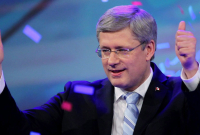Support strong Canadian climate journalism for 2025
Stephen Harper is poised to fire the starting gun for the Oct. 19 federal election as early as Sunday.
Sources say the prime minister is set to visit Gov. Gen. David Johnston within days, possibly as soon as Sunday, to formally dissolve Parliament and launch what will be the costliest and — at 11 weeks — one of the longest campaigns in Canadian history.
Here are five things voters should know about Canada's imminent 42nd general election campaign:
— Elections law requires a minimum campaign of 37 days. It does not impose a maximum length. Harper is choosing to make this the longest traditional campaign in Canadian history.
Only the first two election campaigns after Confederation were longer — 81 days in 1867 and 96 days in 1872 — but in those early days voting was staggered across the country over a period of several months, necessarily extending the length of the campaigns. Since then, the longest campaign was 74 days, way back in 1926.
Four of the last five campaigns were just five weeks long.
— Due to legislation passed last year by the Harper government, campaign spending limits for parties and candidates will increase by 1/37th for every day longer than 37 days.
Even had this campaign lasted just the minimum length, it was already on target to be the costliest in history, with spending limits of about $25 million for each party running a full slate of candidates and an average of about $100,000 for each candidate. Those limits will more than double for an 11-week campaign.
That gives a tremendous advantage to Harper's Conservative party as its candidates have raised more money than any other party.
— Elections Canada estimates that a five-week campaign would cost about $375 million to administer. A longer campaign will mean the agency must pay untold millions more to rent office space, furniture and equipment for returning officers in each of the country's 338 ridings and for staff in those offices.
Taxpayers will also foot the bill for much larger rebates to parties and candidates, who receive reimbursements for 50 per cent and 60 per cent, respectively, of their eligible election expenses.
— The tradition of holding two televised leaders' debates, the pivotal point of modern election campaigns, will not apply this time. The Conservatives upended that tradition last spring by announcing that Harper would not participate in the one French and one English debate sponsored by a consortium of broadcasters.
Instead, there will be a series of at least four debates sprinkled throughout the campaign and sponsored by a variety of sources, starting Aug. 6 with a debate sponsored by Maclean's magazine. The three other debates in which the main party leaders have agreed to participate are being sponsored by the Globe and Mail and Google Canada, the Munk Debates and Quebec television network TVA.
The broadcast consortium is still proposing to hold one French and one English debate in early October but Harper has refused to take part and the NDP, which has agreed in principle only, has signalled that Tom Mulcair won't be there if the prime minister is not. Without two of three main party leaders, it's doubtful these two debates will ever get off the ground.
— Under legislation passed by the Harper government last year, voters will need to produce identification that shows where they live before being allowed to cast ballots. As well, voter information cards sent to all electors by Elections Canada will no longer be considered valid pieces of ID. Electoral experts have warned these two measures could disenfranchise tens of thousands of voters, particularly the elderly, young people and aboriginals who are least likely to have proof of address.
A voter without proof of address can get another person, who is registered to vote in the same polling area and does have the proper ID, to attest to his or her address. A person can attest for only one other person.




Comments